Remembrance Day remembrances
Just as the music has a vital place in the Scottish and Commonwealth military, the pipes have a special role in Remembrance Day. This November 11th, we pay tribute to those who have served and serve, and to those who have made the ultimate sacrifice for the their country and the freedom we enjoy today. We are indebted to the award-winning piper, Captain Fraser Clark, for his heartfelt contribution to pipes|drums.
Remembrance Day remembrances
By Captain Fraser Clark
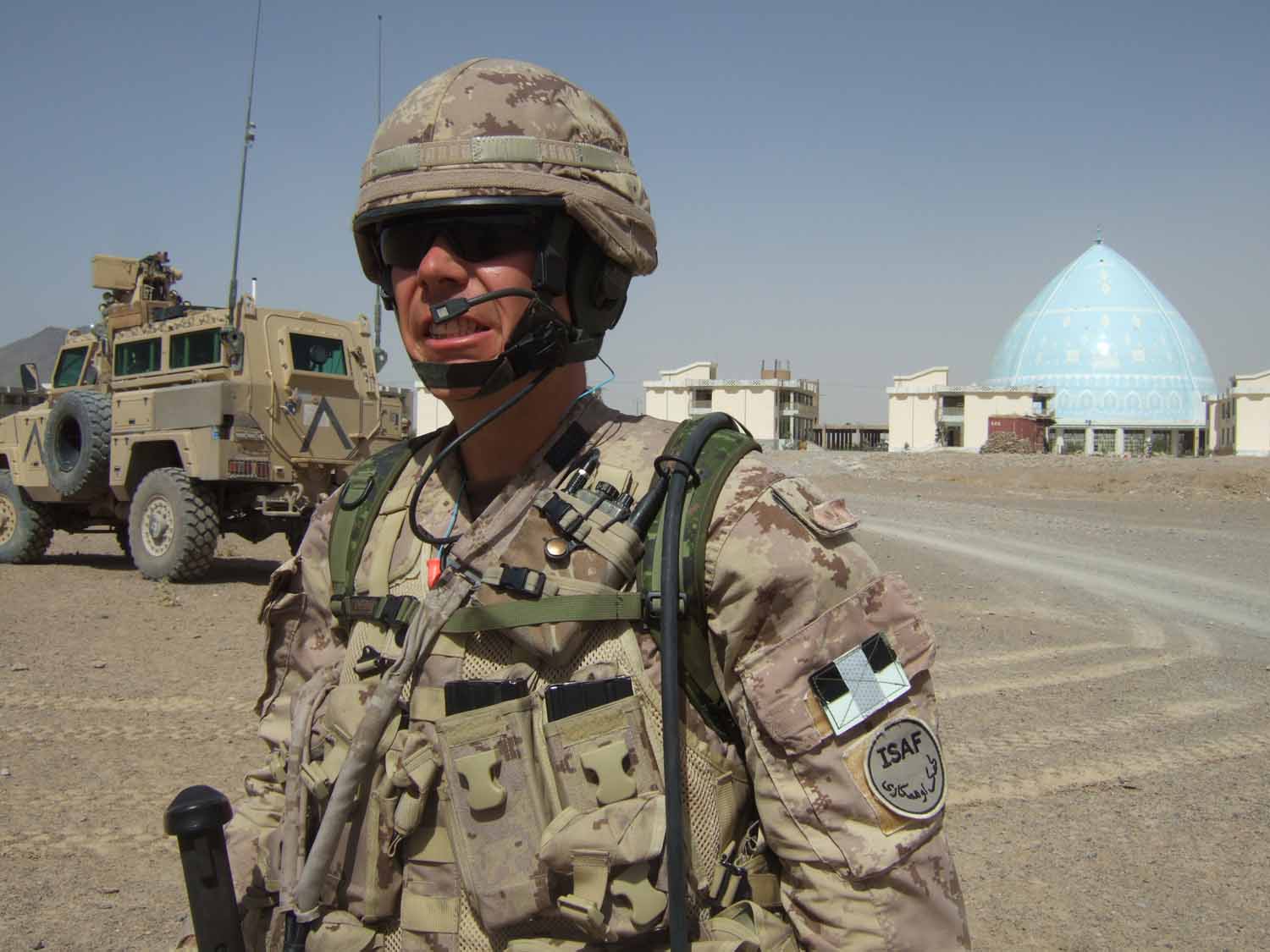
I’ve had the opportunity to pipe at several memorial services across Ottawa, Canada’s capital, in the last few days. In fact, this past Saturday, I was invited to play at a Montreal West-Island graveside for the last surviving member of the Canadian Army Film and Photo Unit of World War II.
Sgt. Nadine Manning, aged 98, was a member of a little-known unit that played an oversized role on the beaches of Normandy in June 1944.
Interesting fact: the Canadian Army Film Unit established the practice of embedding their photographers with Canadian troops in battle. On the day Operation Overlord kicked into action, the Canadian Film Unit’s photographers were at the tip of the spear. Some photographers struggled to control their cameras as they jumped into Normandy with the 1st Canadian Parachute Battalion while others fought to control their battle anxiety and/or sea-sickness in the approaching landing craft hitting the beaches on D-Day.
Working quickly, the Canadian army photographers managed to transport their raw footage out of the battle zone well before their American and British film unit colleagues. Winston Churchill, Franklin Roosevelt and Mackenzie King watched in amazement as Allied soldiers landed on Juno Beach. President Roosevelt, in great anticipation of the forthcoming liberation, authorized the release of the Canadian footage to the American public. And so it happened that the first film footage American movie-going audiences viewed about the liberation of Europe were Canadian soldiers attacking Normandy.
Nadine was a film librarian with the Army Photo Unit in London, England. The images of the soldiers approaching the beach passed through her hands in the summer of 1944.
So, the Canadian Army Film Unit scooped the D-Day landings.
It’s incredible how the tides of history play out in our own day.
While I wandered through Lakeview Memorial Gardens’ Field of Honour following my lament for Nadine, I thought back to the events of this past summer and my own participation in Canada’s long war.
My reflections were prompted when the acting Chief of the Defense Staff, General Wayne Eyre, published a defense-wide message in response to the fall of Panjwayi in Kandahar Province. General Eyre’s remarks were intended, in part, to provide some guiding reassurance for all who poured every last measure of determination into this parcel of geography in south-west Asia and its troubled people.
“Panjwai District, with its place names such as Masum Ghar, Nakhonay, Sperwan Ghar, and Mushan, are indelibly etched into the collective psyche of those who served there. The heat, the dust, the grape rows, and the poppy fields all provide a backdrop to what truly troubles us – our investment of effort, of sweat, and most of all of blood . . .
“So where does that leave us? Should we hang our heads in bitterness and remorse; or should we continue to venerate the sacrifices of so many in our ranks and their families, to honour the noble commitment to service and making the world a better place, and endeavour to learn from our experiences, grow, and become better every day? While none of us can speak for them, I have to believe that our fallen would want us to pursue the latter.”
I couldn’t have said it better.
Should we hang our heads in bitterness and remorse; or should we continue to venerate the sacrifices of so many in our ranks and their families, to honour the noble commitment to service and making the world a better place, and endeavour to learn from our experiences, grow, and become better every day? While none of us can speak for them, I have to believe that our fallen would want us to pursue the latter.
I served with the Canadian task force in 2008 as the public affairs officer with the Provincial Reconstruction Team in Kandahar City. Before I deployed, I spent 10 months in Edmonton and Wainwright, Alberta, training with B Company, 1st Battalion Princess Patricia’s Canadian Light Infantry. As far as I know, I was one of the few staff officers to walk away from pre-deployment training with a Gun-Fighter course, a T-Triple-C qualification, and lifelong friends in all three Patricia battalions.
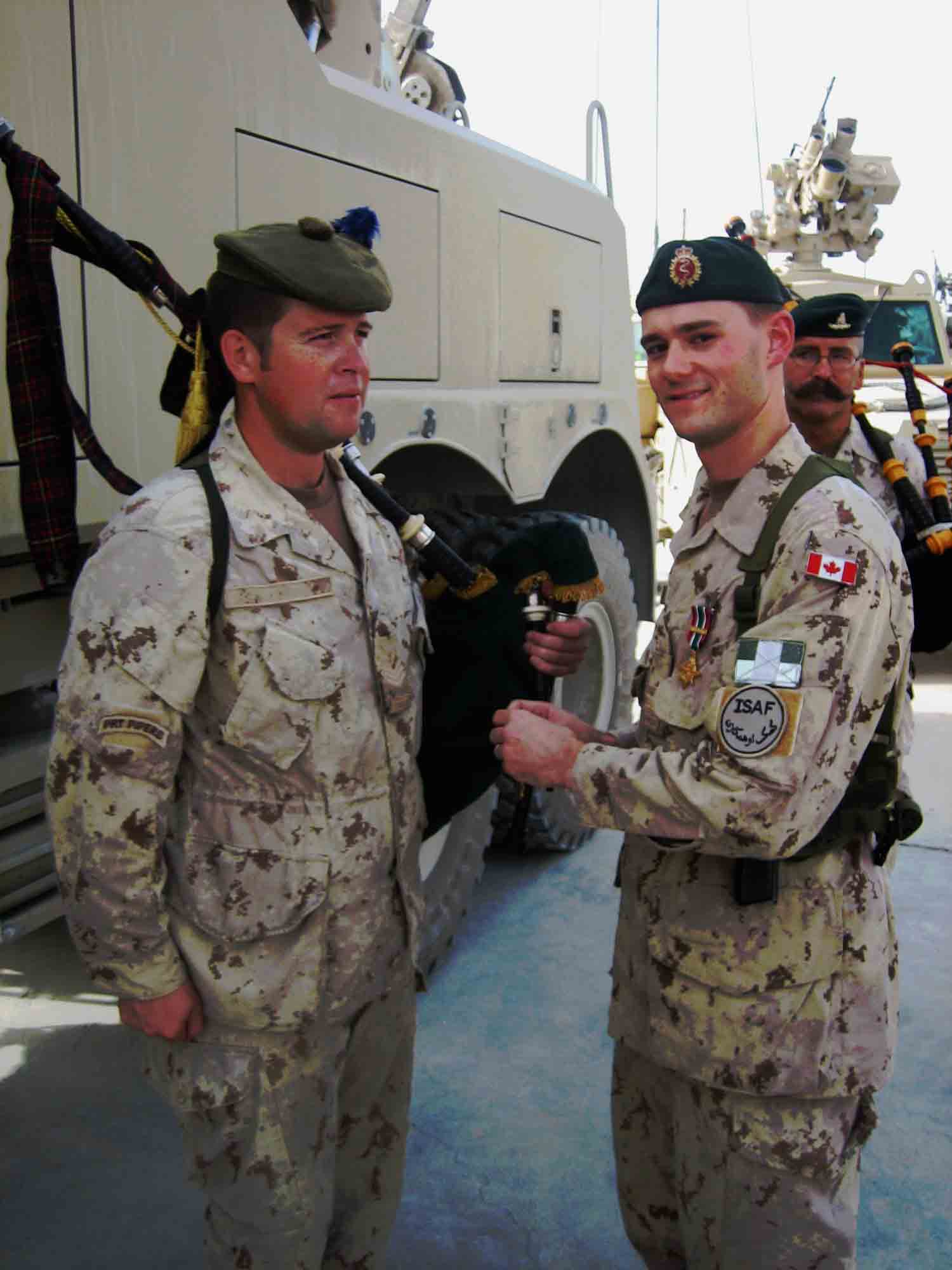
General Eyre’s letter last July brought back some intense imagery for me (and not just my time on those dusty roads in Kandahar City but for the entire panoply of the 18-month experience in Alberta and Afghanistan.) Although I have random thoughts about our tour since I returned, I hadn’t thought-over the experience in its entirety in a decade.
Here is the story of one of the 23 laments I performed during my tour in Afghanistan.
One of my duties was to accompany the Quick Reaction Force (QRF) whenever a Canadian or allied convoy lit-up in the city (“lit-up” refers to an insurgent attack, typically in the form of an IED strike although ambushes involving Taliban fighters was not uncommon throughout my tour). We would arrive on-scene, secure the blast site, dress the wounded etc. Those experiences were something else altogether.
I brought my pipes overseas to fulfill my secondary duty as the unit piper at Camp Nathan Smith. (I wasn’t the only piper in the unit – Sergeant John Dawson of the Winnipeg Queen’s Own Cameron Highlanders was the alternate while Master Warrant Officer “Chuck” Norris of the Royal Canadian Artillery was a welcome addition to the highland mob…but then there is always “one” in every unit – that “one” was the redoubtable Sergeant Tim Seeley – the Cameron Highlanders’ leading-drummer who was a tactical CIMIC team leader in Panjwayi – what a lad). Whenever Canadian soldiers were killed in action, we held remembrance services in our memorial garden at precisely the same time as the ramp ceremonies at Kandahar Airfield.
Shortly after my first QRF run, I was ordered to get my pipes out. A Strathcona trooper was killed on his rip-out (he was leaving theatre from Panjwayi after surviving eight months in the sandbox when his vehicle ran over a remote detonated IED).
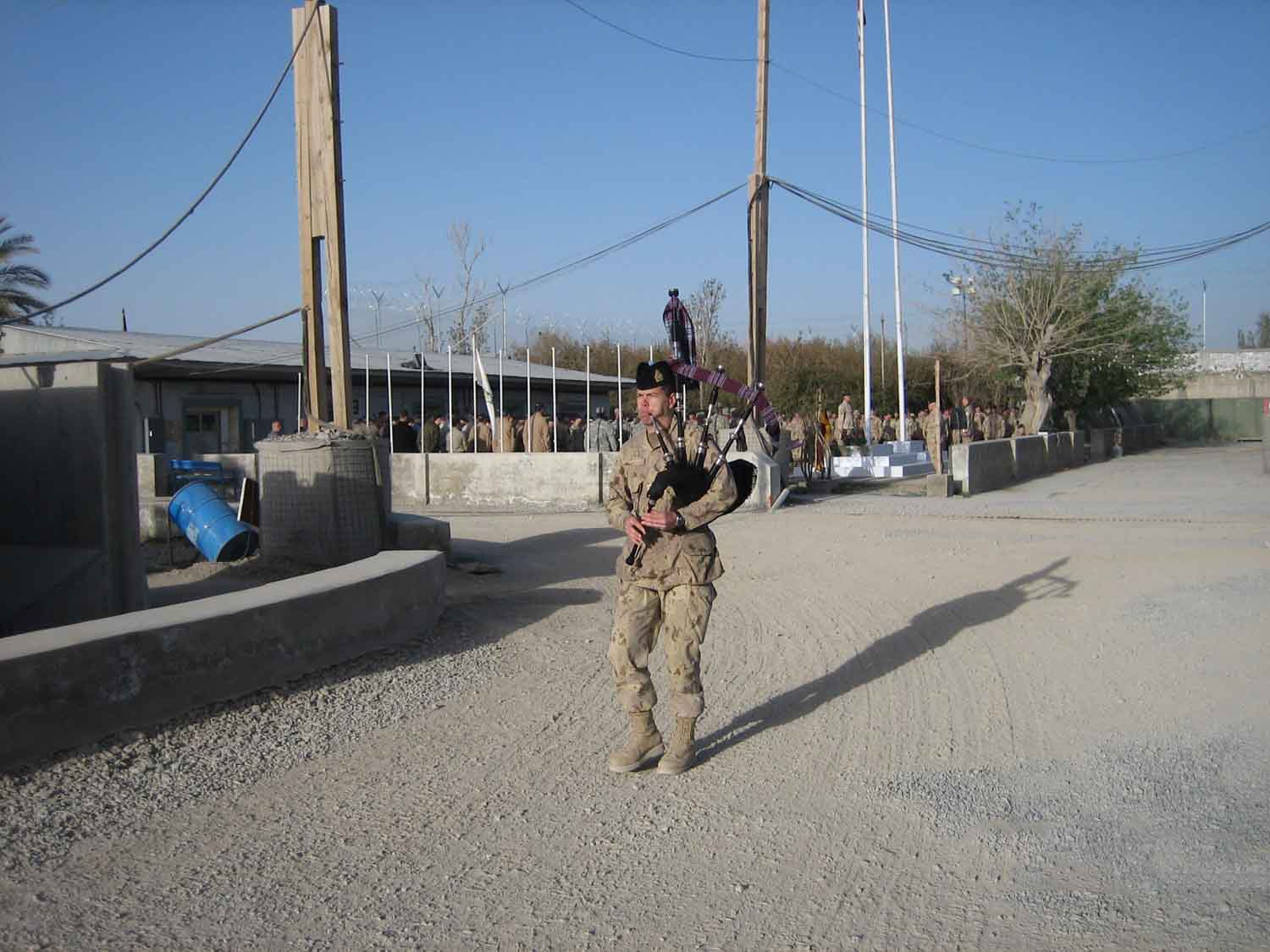
The commanding officer (CO) called me to his office to discuss the format for the Service of Remembrance. The CO asked what I was going to perform following the bugle call “Last Post.”
“Well, sir, I can either play the official Canadian Forces lament, or I can play ‘Amazing Grace,’ which everybody will recognize.”
“Play ‘Amazing Grace.'”
A short time later, our troops made their way to the memorial garden, 350 all ranks, and formed up in three’s while I stood across a tiny flower garden facing them.
At the appropriate moment, I struck-up my pipes and played the tune while everyone bowed their heads. The padre recited the dedication which concluded our tribute to Trooper Hayakayzi.
When the unit dismissed, each soldier lined-up in single-file to salute a small, framed photo of our fallen soldier. This photo was placed at the base of the camp’s flag-pole where a half-masted Canadian flag flew.
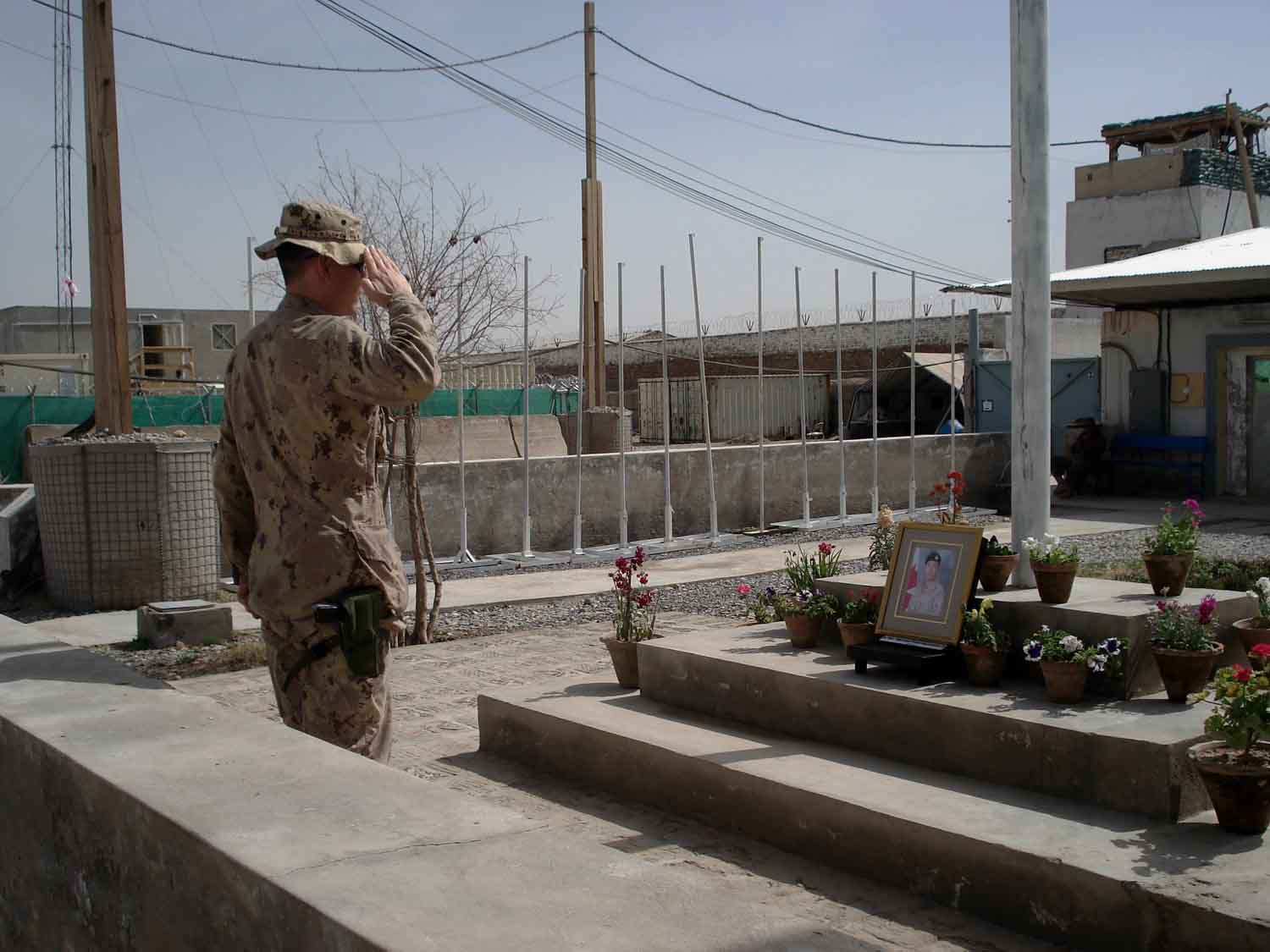
Following my duty, I retired to the mess tent. I put my instrument away thinking the performance went well when immediately through the canvas door busted the battle adjutant: “CO wants to see you, Fraze. Now.” His tone belied a seriousness I’d never associated with my piping.
As I approached the CO’s office, I could feel my heart pounding while a thousand thoughts raced thru my head. What did I do wrong? Were my pipes out of tune? Did I make a note mistake? Did I miscount the two minutes of silence and strike-in early?
I arrived at the office and the colonel stared across his desk at the regimental sergeant major, the padre and the battle adjutant.
“Sir,” I said as I stood to attention at the lip of the door, “Was there something wrong with today’s ceremony?”
“Something wrong? Oh, yeah, everything you did was wrong.”
Oof. My heart sank.
I wasn’t sure how I bungled the most popular bagpipe piece in the world, but here was the CO accusing me of ruining an official service of remembrance – our first in theatre.
“Amazing Grace has to go Fraser; it’s too sad for the troops. I don’t want to hear that song played in my camp ever again. Understood?”
“Sir.”
“You’ve got until tomorrow morning to find a replacement.”
“Sir.”
I wasn’t sure how I bungled the most popular bagpipe piece in the world, but here was the CO accusing me of ruining an official service of remembrance – our first in theatre.
Defeated, I slinked out of the office and returned to my sea container wracking my brain for the rest of the day and night, practicing tunes on my chanter.
The next day, I reported to the CO’s office.
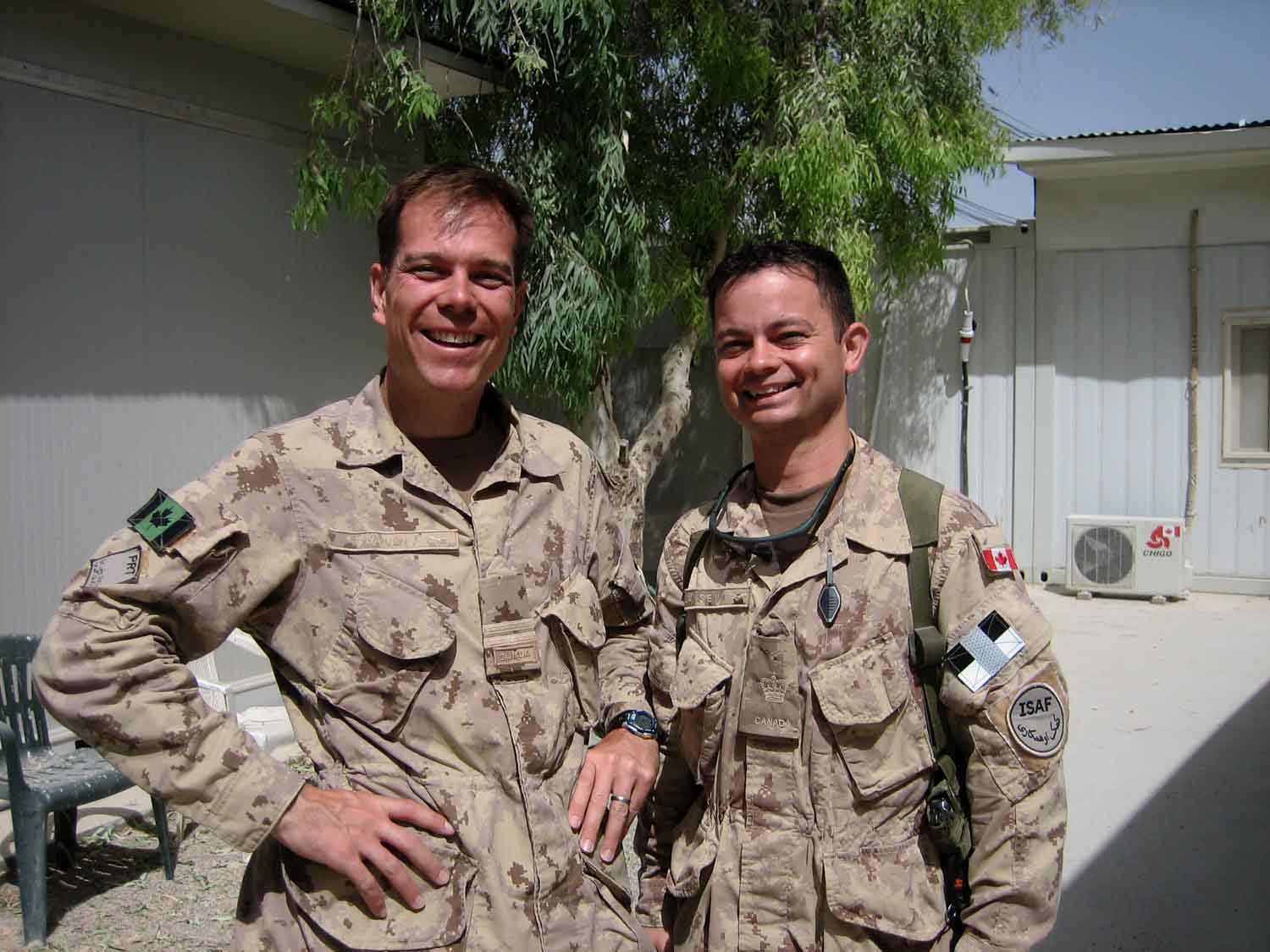
“Here’s my plan Sir: I’m going to memorize the regimental marches of each regiment, corps or branch represented in the task force and I’ll play those marches for the fallen for the rest of our tour.”
“Ok. Carry-on with the plan but remember, no more ‘Amazing Grace.'”
“Yes, sir.”
And so it was for the rest of the tour.
It wasn’t many more days, perhaps a week, before I was next called to perform a shadow ceremony and this time it was for a fallen Patricia soldier. “It’s a Long Way to Tipperary” was my tune. The next ceremony I played “Wings” for the Engineers killed in action.
Too many marches and too many lives cut short.
When I look back, I can say I gave my best performances over there. I also think that the soldiers in my unit who stood in silence as I played their regimental melodies will never hear their music in the same way again.
For my part, those services in South-West Asia form a tiny portion of the greater memory of our service in Afghanistan. And to this day, on the 11th of November, I pull-out my pipes and play through the music of my old comrades.
At the going down of the sun and in the morning, we will remember them.
Captain Fraser Clark is a winner of the Piobaireachd Society (Canada) Gold Medal, among many other piping prizes. With a long career in Canada’s military, he was recently appointed Adjutant/Deputy Commanding Officer of the Canadian Army’s Ceremonial Guard. We thank Fraser Clark for his service. He is based in Ottawa.
Related
 Canadian Armed Forces drummer adds voice to mental health awareness (video)
Canadian Armed Forces drummer adds voice to mental health awareness (video)


Thank-you Fraser for writing this. Brings back memories of my tours and the unfortunate yet honourable duty of playing at ramp ceremonies. Their names etched permanently in my memory. I agree, those were our greatest performances.